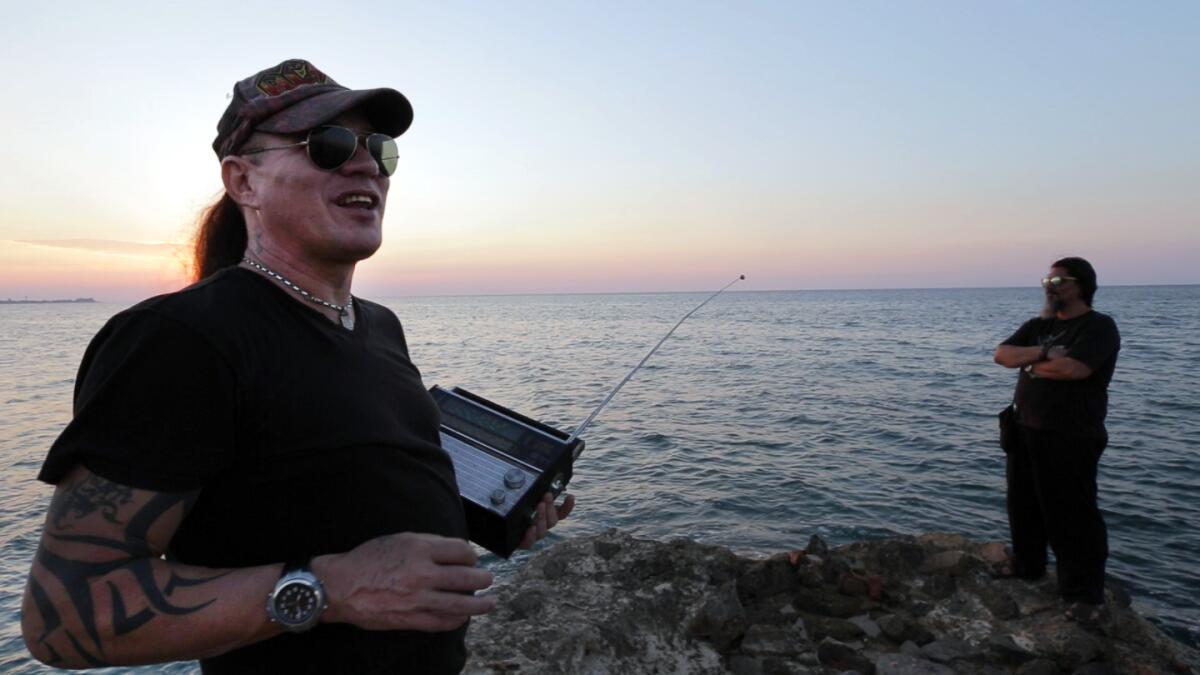A heavy metal hero on a mission in Cuba blasts through in ‘Los Últimos Frikis’

- Share via
The idea that heavy metal bands exist in Cuba — and that they belong to a government entity with the comically Orwellian name of the Rock Agency — may be hard for some to believe.
But in the documentary “Los Últimos Frikis” (available on iTunes, Vimeo On Demand and the streaming service Topic), we meet Zeus, an influential Havana band that not only embodies metal’s hardcore spirit but has managed to survive for 34 years despite releasing only two albums and operating under a regime with little tolerance for “decadent” Western culture.
Filmed intermittently over the course of a decade by U.S. director Nicholas Brennan, the 85-minute Spanish-language doc is the follow-up to Brennan’s 2009 short “Hard Rock Havana,” which premiered at the Tribeca Film Festival. Its positive reception led the director to the more extensive “Los Últimos Frikis,” which catalogs the countless challenges faced by a band that has never managed to perform beyond the confines of its tropical homeland.
“My first trip to Cuba was in 2009, as a student, and I was very surprised to find the same music that I grew up with and that I loved,” says Brennan, who was born in Maine and lived in New York for 15 years. He relocated to London at the start of the pandemic.
“That was the connection and what made me not only start this project but decide to keep working on it for almost a decade,” adds the director, who grew up playing drums — he was more a punker than a rocker then — before he switched to filmmaking.
“Los Últimos Frikis” depicts many moments of disappointment and frustration for the members of Zeus — even after the Cuban government, doing a sudden about-face, decides to support the band. Yet Brennan believes that the film carries a message of hope, which has a lot to do with the personality of Zeus’ irrepressible lead singer, Dionisio “Diony” Arce.

Speaking by phone from his Havana home, Arce waxed philosophical about why, and how, he’s been able to endure as a heavy metal frontman in a country where saying — or singing — the wrong thing can be hazardous for your career (or worse).
“This is something that I have believed all my life: Each country must have a band that speaks the language of metal,” the vocalist says.
His conversion to the united nations of rock ‘n’ roll began in the mid-1970s after listening to Johnny Winters, Fleetwood Mac, King Crimson and Led Zeppelin through the radio signals that floated across 90 miles of airwaves from Miami to Havana.
“Exposing yourself to this music was practically impossible if you did not have a good antenna or did not know some of the few people who had the possibility of traveling abroad and who returned with the records or cassettes that they bought there,” he says.
In the 1980s, Arce’s tastes turned rougher: Iron Maiden, W.A.S.P., Bon Jovi and Poison. Later, he gravitated toward head-bangers like Manowar, Overkill, Metal Church and the German group Helloween. By the ‘90s, he’d broadened his horizons again and embraced the ear-throttling extremes of Sepultura (you know, from Belo Horizonte, Brazil), Pantera, Megadeth and Metallica.
“You had to listen to it quietly or with headphones, because you annoyed the neighbors,” he recalls. “People who listened to music in English weren’t viewed kindly because it was seen as the enemy’s music. Those who listened to it were accused of ‘ideological diversionism.’ ”
It always had been Arce’s nature to divert, ideologically or otherwise.
“I was young and I always wanted to consume what was forbidden, or what they told me not to listen to,” says the singer, who once was handed a six-year prison sentence for reasons he still prefers not to detail. “All the problems I had at that time, I encountered them by listening to music in English.”
But Arce was not content with simply listening.
In 1981, he signed on as a vocalist for the band Venus, a Cuban heavy metal pioneer. Despite recording fewer songs than you could count on one hand, its tunes gained an audience through a rock radio space called “El Programa de Ramón.” Before any song could be broadcast, its lyrics had to pass muster with an official “literary advisor.”
Venus also performed live in government-sponsored “cultural houses,” at private parties and, on the last Sunday of each month, in a Havana auditorium. But these gigs ended suddenly when the authorities decided the group could no longer exist.
Adrift once more, Arce in 1988 briefly joined the band Zeus, which had formed not much earlier. But he didn’t become a major presence in the group until 1997.
“At that time there was an opening that allowed bands to rehearse, play and try to become professional,” he says. “We’ve continued since then, despite the fact that we had, and still have to face, many obstacles, especially when we want to do events.”
For Brennan, the ongoing challenge of see-sawing U.S.-Cuba relations — Barack Obama opened up a window for cultural exchanges only to have Donald Trump largely slam it shut — didn’t affect the filmmaking process.
“The short film, which had already been seen in Havana, allowed us to obtain the necessary permission to shoot the feature film,” he says. “The real risk was not for the filmmakers but for the members of the band and the ‘forbidden truth’ of which they speak.”
“Los Últimos Frikis” is officially an American production, but it features an impressive number of Cuban workers. The director collaborated closely with cinematographer Javier Labrador, “who did a beautiful job and helped me capture everything in the best possible way,” Brennan says. “It seems to me that this ended up being a half-Cuban, half-American job.”
Another key collaborator on the film was Dave Lombardo, the legendary drummer of Slayer and current member of Suicidal Tendencies. Born in Havana — which he fled with his family when he was 2 — Lombardo visited Cuba for the first time in a half-century at Brennan’s invitation. After bringing Suicidal Tendencies to the island for a concert with Zeus, Lombardo agreed to compose the documentary’s powerful soundtrack.
“Dave and I connected shortly after the short film came out, and our friendship developed over time,” Brennan says. “He believes that having grown up listening to Cuban rhythms was what allowed him to create the revolutionary style that distinguished him in Slayer.”
Brennan adds: “I think he saw in Zeus the alternative version of what would have happened to him if things in his life had been different.”
For Arce, meeting Lombardo “was something divine.”
“He is one of the most sincere and humble musicians I have ever met,” he says. “The members of Zeus will be eternally grateful to him for having placed this trust in us. We consider him an example to follow for all Cuban musicians around the world.”
Curiously, as the film reveals, lately government meddling hasn’t been as much of a threat to Zeus as the shifting preferences of Cuban youth for a musical genre that’s heavy metal’s nemesis: reggaeton.
“Metal has always been about expressing yourself openly and physically to reject what is being imposed on you, while reggaeton is a celebration of having a good time,” Brennan says. “They are two very different concepts of what music can be, and the film shows at a certain point the time of joy that occurred during the Obama period, which was in stark contrast to the stage of development of Zeus, when everyone was hungry and what they wanted to do was go to a concert to get into a mosh pit.”
In the film, Arce acknowledges his exasperation with reggaeton — though he likes to dance to the genre-mashing timba of Los Van Van, the legendary Cuban band led by the late Juan Formell.
“The company that sets up the tours and that does it through the Cuban Rock Agency, sometimes puts you in concerts with artists who have nothing to do with what you do, which could cause problems between the ‘heavies’ and the reggaetoneros who already ingested a lot of rum,” Arce says. “But what we have started to do now with the agency is to put together posters in which there are only representatives of the same rock ‘n’ roll style.”
And thus it came to pass that in 2019, strange as it may seem, Arce was appointed director of the 12-year-old Rock Agency. His new status allowed him to help establish the Havana live venue called the Maxim Rock room, which can host up to 1,000 rockeros but has been hampered by the COVID pandemic).
The Cuban Ministry of Culture has continued to pay a “very decent” and stable monthly salary to each of the members of the numerous bands that belong to the agency, Arce says. That largesse has allowed them to survive without many (or any) live concerts, beyond a limited number of paid gigs on Cuba’s state television.
“We must recognize that they have not left us helpless and that they have even supported us in projects that we have presented,” Arce says.
After so many years of struggle, Arce attributes his government promotion to perseverance and his transparency in dealing with state regulators.
“I have always spoken with the authorities head on, telling them what I think,” he says. “I think they have also realized that Cuban music has to include rock in its representation, because that is something that happens all over the world.”
Brennan believes that Arce’s stature reflects not only the singer’s relentless work over the years, but also a change of mentality by the Cuban government.
“It is a great responsibility for him,” the director says, “because he has spent his life fighting for things to change and now he is in the right place to make those changes.”
More to Read
The biggest entertainment stories
Get our big stories about Hollywood, film, television, music, arts, culture and more right in your inbox as soon as they publish.
You may occasionally receive promotional content from the Los Angeles Times.











